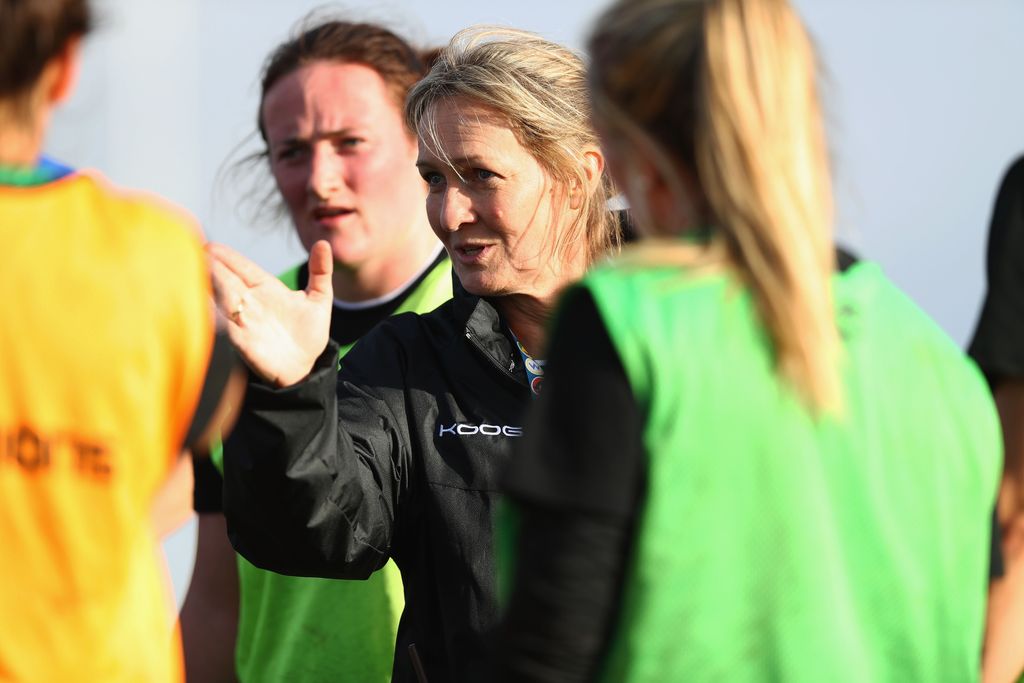Lo que no sabe Giselle Mather del alto nivel de rugby probablemente no valga la pena saber.
Como jugadora estuvo en el éxito del seleccionado femenino en la Women's Rugby World Cup en 1994 como apertura y doce años más tarde ayudó en el segundo título de las Red Roses como entrenadora de backs.
Desde entonces, Mather se convirtió en la primer entrenadora de las mujeres de Barbarians y actualmente trabaja con las Wasps Ladies como directora de rugby, conduciéndolas al play-off en la primera temporada de la Tyrrells Premier.
Antes de regresar a Wasps, cuando trabajaba en London Irish ayudó en su desarrollo a futuros internacionales Joe Cokanasiga, Alex Corbisiero, Jonathan Joseph and Anthony Watson.
Punto de venta
“Las mujeres no queremos ser como los varones, pero queremos jugar de la misma manera," dijo.
“Jugamos con nuestro estilo y hasta más lindo ya que no hay tanto choque físico."
Women's Rugby World Cup-winning fly-half Giselle Mather reveals what she loves about coaching, in both the women’s and men’s game.https://t.co/JKkej8CbEH pic.twitter.com/OsvgDX0b7C
— World Rugby (@WorldRugby) February 21, 2019
“Es diferente."
Sus expectativas para el rugby femenino los próximos 20, 30 años, están "en que sea más accesible, con mas seguidores, profesional para que las jugadoras pueda estar comprometidas."
“Pero de alguna manera queremos que sea diferente que los varones, con nuestro sentido."
“Quiero que juguemos con nuestro estilo.”
Straight to the top
Mather herself was a late adopter, discovering at university that a background in athletics, fencing, football, judo and netball gave her the perfect base for rugby. Within months she was an England international.
But gone are the days when potential players who have never previously picked up an oval ball are encouraged to turn up and audition for a place in the first-team squad on the weekend.
Interested women and girls might still pitch up but the advances made by elite level clubs and players, particularly in terms of strength and conditioning, mean that it is impossible now to be pitched straight into action.
In her role at Wasps Ladies, Mather is playing a hands-on role in the development of the women’s game and she has not been surprised by the strides that have been made in England since the inception of the Tyrrells Premier 15s less than two years ago.
“Inside those athletes has been a huge potential waiting to get out and for it to get out it needed full-time staff, it needed proper medical departments, it needed strength and conditioning, it needed analysts,” she said.
“Now that it’s got that the players are flying out, the potential is just [huge].
“It may well plateau soon because you reach that stage before you can kick on but no, I’m not surprised at all. I think it’s something that has been waiting to happen.
“It’s amazing to watch and a real privilege to be coaching in.”
Best person for the job
Wasps Ladies are one of only four Premier 15s clubs to have a female director of rugby or head coach. But Mather is confident that work is being done by the Rugby Football Union to grow that number.
“There’s several females now on level threes and level fours (coaching courses),” she said.
“There’s been a big push from the RFU to qualify females, which is great, and give them the confidence to realise that they are actually very good at it.
“I’m not of the ilk that you get a job, [or] because it’s female sport you put a female director of rugby in there. I’m not of that.
“If they’re the best person for the job, yes. If they’re not, no – and I think that across every walk of life.
“But you can support, you can nurture, you can help so that they grow in that environment ready to take and then they do become the best person for the job.”
Mather supports World Rugby’s drive to help more women fill leadership roles within the sport, and feels that opportunities for female coaches – in the men’s and women’s game – will only increase with more diversity at boardroom level.
Different strengths
“From World Rugby’s point of view, to put people on the boards then people are seeing females do it. And do you know what, they add so much. Diversity in anything adds,” she said.
“The thing that I obviously know best not the world of the boardroom, [and] if you put a diverse coaching team together you catch all your players because they can relate to at least someone really well.
“If you have a coaching group full of clones of ex-players they’re all very similar, they’ve all gone through the same life experience. So you’ll catch a certain group and catch them well but you’re going to leave people out.
“You need different strengths in your coaching team. You need people who can listen, you need people who can keep the discipline, you need people who can tactically work it out, you need people who are really good at detail, you need people who are really good at motivation.
“And if you’ve got that, wow, have you got a good coaching team.
“And it’s the same in the boardroom, if you have a diverse look on things then the discussions that happen in that boardroom are going to be wider and they pick up things before they happen.”
